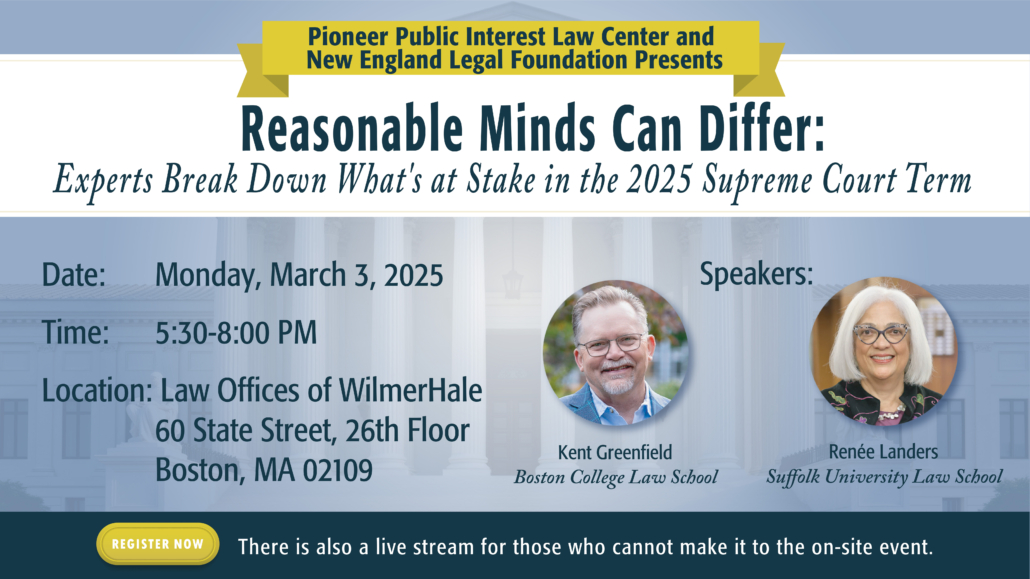MORE ARTICLES
 Director/Actor Samuel Lee Fudge on Marcus Garvey & Pan-AfricanismFebruary 26, 2025 - 1:31 pm
Director/Actor Samuel Lee Fudge on Marcus Garvey & Pan-AfricanismFebruary 26, 2025 - 1:31 pm State Report Card on Telehealth Reform: Progress Slowed in 2023 Leaving Patients Without AccessFebruary 26, 2025 - 12:02 pm
State Report Card on Telehealth Reform: Progress Slowed in 2023 Leaving Patients Without AccessFebruary 26, 2025 - 12:02 pm Wildflower’s 70+ Microschools, Eight Years Later: Did Matt’s Vision Become Reality?February 20, 2025 - 2:31 pm
Wildflower’s 70+ Microschools, Eight Years Later: Did Matt’s Vision Become Reality?February 20, 2025 - 2:31 pm Pioneer Institute Study Says MA Housing Permitting Process Needs Systemic ReformFebruary 19, 2025 - 7:09 pm
Pioneer Institute Study Says MA Housing Permitting Process Needs Systemic ReformFebruary 19, 2025 - 7:09 pm Cornell’s Margaret Washington on Sojourner Truth, Abolitionism, & Women’s RightsFebruary 19, 2025 - 1:08 pm
Cornell’s Margaret Washington on Sojourner Truth, Abolitionism, & Women’s RightsFebruary 19, 2025 - 1:08 pm UK Oxford & ASU’s Sir Jonathan Bate on Shakespeare’s Romeo and Juliet & LoveFebruary 14, 2025 - 11:41 am
UK Oxford & ASU’s Sir Jonathan Bate on Shakespeare’s Romeo and Juliet & LoveFebruary 14, 2025 - 11:41 am Mapping Mass Migration – New 2024 Census Estimates Show Surge in Population Growth, With Considerable CaveatsFebruary 13, 2025 - 1:13 pm
Mapping Mass Migration – New 2024 Census Estimates Show Surge in Population Growth, With Considerable CaveatsFebruary 13, 2025 - 1:13 pm Curious Mike’s Visit to Rain Lily MicroschoolFebruary 13, 2025 - 10:46 am
Curious Mike’s Visit to Rain Lily MicroschoolFebruary 13, 2025 - 10:46 am Steven Wilson on The Lost Decade: Returning to the Fight for Better Schools in AmericaFebruary 12, 2025 - 9:47 am
Steven Wilson on The Lost Decade: Returning to the Fight for Better Schools in AmericaFebruary 12, 2025 - 9:47 am Study Finds Bump in State Population Due to Changes in Census Bureau MethodologyFebruary 11, 2025 - 7:00 am
Study Finds Bump in State Population Due to Changes in Census Bureau MethodologyFebruary 11, 2025 - 7:00 am
Stay Connected!
Receive the latest updates in your inbox.


NYT Bestseller Jonathan Eig on the Rev. Dr. Martin Luther King, Jr.
/in Education, Featured, Learning Curve, News, Podcast /by Editorial StaffJonathan Eig delves into MLK’s early spiritual leadership, the influence of Langston Hughes on his speeches, his relationship with his wife, Coretta Scott King, and the Southern Christian Leadership Conference’s challenges. He discusses historic events in Birmingham, Alabama, the March on Washington, MLK’s struggles in Chicago, the Poor People’s Campaign, and the events leading to his assassination in 1968. Eig underscores the multifaceted aspects of MLK’s life and provides insights on drawing lessons for contemporary challenges in race relations and leadership.
My Musings on Massachusetts’ Fiscal Picture
/in Blog, Blog: Economy, Economic Opportunity, Economic Opportunity, Featured, News, Pioneer Research /by Eileen McAnnenySince the start of FY2024 on July 1, 2023, the state has experienced six straight months of revenues falling short of expectations. The single biggest factor is the unprecedented growth of the state budget since FY2021. The $15 billion increase in state spending contextualizes the seemingly modest projected revenue growth of 1.6 percent for FY2024 by highlighting that the base is very inflated.
Olympic Track Medalist Gabby Thomas
/in Education, Featured, Learning Curve, News, Podcast /by Editorial StaffGabby Thomas, Pioneer Valley native, Harvard alum in neurobiology, and Olympic sprinter, won bronze and silver in Tokyo, she also pursued a master’s in epidemiology. She shares her journey excelling both in academics and athletics.
Drug Discount Distortions: How Middlemen Increase Costs and Reduce Access
/in Featured, Healthcare, News, Podcast Hubwonk /by Editorial StaffJoe Selvaggi talks with Drs. Bill Smith and Robert Popovian about how the complex system of rebates from drug companies to insurance firms serve to increase costs and reduce access for patients.
Two Time Pulitzer Winner T.J. Stiles on Cornelius Vanderbilt & American Business
/in Education, Featured, Learning Curve, News, Podcast /by Editorial StaffT.J. Stiles delves into the life of America’s first tycoon, Cornelius Vanderbilt, exploring his rise to historic wealth in steamboats, shipping, and railroads. He discusses Vanderbilt’s legal battles, philanthropy, and enduring legacy, exploring his business competitiveness and wide impact on 19th-century America’s economy.